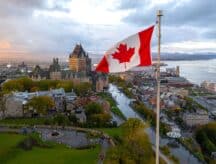Stay home: Travellers to Canada must quarantine for two weeks
Canada now has mandatory quarantine requirements for travellers who enter the country during the coronavirus pandemic.
These requirements differ depending on whether or not the traveller has symptoms of COVID-19. People with symptoms are not permitted to board a plane to Canada, though they are still allowed to cross the border by land.
Canada has restricted travel to the country for many foreigners, however, there are exceptions. Citizens, permanent residents, temporary foreign workers, immediate family members, and a few other individuals are still allowed to come to Canada. International students may be allowed into the country if their study permit was approved before March 18.
Find out if you are eligible for any Canadian immigration programs
It is still possible to leave Canada, however, flights have been restricted and there is a travel health notice to avoid all non-essential travel to all foreign countries.
Everyone who is allowed into Canada is required by law to go immediately to their homes, or the place where they will quarantine themselves for the next 14 days. Stopping at the grocery store, or going to a friend’s place on the commute between the Port of Entry and home is strictly prohibited, and if caught, travellers could face fines or jail time.
Visitors, work permit holders, and study permit holders may be required to isolate even if they are not showing symptoms.
What should I do if I have symptoms of coronavirus?
If you have any of the symptoms associated with the novel coronavirus, such as fever, cough, or difficulty breathing, you will need to isolate as soon as you arrive. Violating the instructions provided upon entry to Canada could mean up to six months in prison, a $750,000 fine or both, the government website says. Canada will provide symptomatic travellers immediate medical attention when needed.
Isolating means you must go directly to the location where you will be staying, and remain there for 14 days. You must use private transportation in order to get there as taking a taxi, rideshare, or public transit is prohibited. Transit will be arranged by the federal government for those who do not own a vehicle.
If you do not have a place to isolate you will be required to go to a facility designated by the Chief Public Health Officer of Canada.
Once there, you must stay inside your home. You may only leave if it is to seek medical attention.
The government recommends that people who share living accommodations should avoid using the same bathroom as others, if possible. Limit contact with others inside the home, including children, and do not have guests. Officials also recommend isolating in a place where you will not have contact with vulnerable people, such as seniors and people with underlying medical conditions.
As you remain in isolation you must continue to monitor your health. If your symptoms get worse, contact your health care provider or public health authority and follow their instructions.
What if I do not have coronavirus symptoms when I come to Canada?
Even if you do not show symptoms you are still at risk of developing them and infecting others. The rules for quarantine are less strict than isolation, however, the consequences are the same for violating instructions provided upon arrival; six months in prison, a $750,000 fine, or both.
Asymptomatic travellers must go directly from the airport or border to their place of quarantine and stay there for 14 days.
Unlike people who are required to isolate, under quarantine you can take public transportation to get home if you arrive in Canada without symptoms, though you may not stop on the way. The government also recommends staying at least two arms lengths away from others at all times.
During your period of quarantine, you can go outside if it is in your own yard or on your balcony. Do not go out to public areas and have someone pick up groceries and medications for you.
Monitor your health. If you develop symptoms within two weeks of your date of arrival, you should isolate yourself from others and immediately call a healthcare professional. They will need you to describe your symptoms and travel history.
The Government of Canada provides a list of locations where people may have been exposed to COVID-19. You can see if you visited one of these exposure locations by checking the government website.
Do you have more questions on coronavirus and Canada immigration?
© 2020 CIC News All Rights Reserved
- Do you need Canadian immigration assistance? Contact the Contact Cohen Immigration Law firm by completing our form
- Send us your feedback or your non-legal assistance questions by emailing us at media@canadavisa.com







